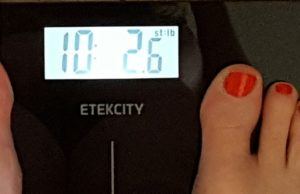The Problem With Having A Weight Loss Goal
When clients tell me that they want to lose weight, that’s often their primary focus. However, they find it helpful when I explain that a weight loss goal needs to be regarded as ‘Step 2’, or the second priority, and that ‘Step 1’, the primary focus, needs to be addressing their actual current eating behaviour. If a person eats large portions, eats quickly, or regularly makes poor food choices and then they go on a diet, they might lose weight if they stick to the diet but weight re-gain is likely if they haven’t addressed their underlying eating habits and go back to their old ways once they’ve lost weight.
Weight Loss Clubs Focus On Weight
In my work I often hear a good number of people say that they’re sick of dieting, and tired of the weight loss clubs. A client recently told me she was sick of her usual slimming club as it was the ‘same old stuff’, with the main topic of conversation being  how much weight people had lost. This client had come to realise that dieting wasn’t the answer for her any more- she still had a need to lose weight but she didn’t want to keep going on diets to get there- she wanted a new ‘lifestyle’ approach which she could adopt long-term, as whenever she lost weight she would re-gain most, if not all of it. People can have great results losing weight with traditional weight loss clubs, but advice on how to address eating behaviour long-term isn’t necessarily covered. Some weight loss plans promise rapid weight loss- this seems appealing to many people and the results can be great in terms of weight loss results, but ultimately they don’t promote long-term behaviour change. The appeal of meal replacement programmes is that you don’t have to make any decisions about what to eat- it’s all done for you in the form of food packs and shakes. Unfortunately I’ve met many people who have completed such programmes and they end up feeling anxious at the thought of going back to ‘normal’ food choices post weight loss. Weight loss clubs can also encourage comparison between members, where a person’s success is measured primarily by a number on the scales rather than how well they’re managing to discard old, ingrained, unhelpful eating habits.
how much weight people had lost. This client had come to realise that dieting wasn’t the answer for her any more- she still had a need to lose weight but she didn’t want to keep going on diets to get there- she wanted a new ‘lifestyle’ approach which she could adopt long-term, as whenever she lost weight she would re-gain most, if not all of it. People can have great results losing weight with traditional weight loss clubs, but advice on how to address eating behaviour long-term isn’t necessarily covered. Some weight loss plans promise rapid weight loss- this seems appealing to many people and the results can be great in terms of weight loss results, but ultimately they don’t promote long-term behaviour change. The appeal of meal replacement programmes is that you don’t have to make any decisions about what to eat- it’s all done for you in the form of food packs and shakes. Unfortunately I’ve met many people who have completed such programmes and they end up feeling anxious at the thought of going back to ‘normal’ food choices post weight loss. Weight loss clubs can also encourage comparison between members, where a person’s success is measured primarily by a number on the scales rather than how well they’re managing to discard old, ingrained, unhelpful eating habits.
Goal Setting Is Black And White
A goal is a bit black and white- you either achieve it or you don’t. With a weight loss goal, if we don’t achieve it we can end up becoming disheartened and feel like a failure. If we do achieve it, it can be highly motivating and we might feel great, but if we’ve not tackled our eating habits and we go back to our old ways post-diet there’s a very good chance of weight regain. The other issue is that if a person has a lot of weight to lose and sets themselves a weight loss goal, they might see their weight loss goal as a huge mountain, and not only keep putting off efforts to reach it because the task seems so big or if they do make a start, after losing some of the weight they might give up because they feel they’ve hardly made a dent in reaching their final goal; perhaps too they’ve put themselves on a restrictive, unenjoyable diet which is far-removed from their usual eating.
The Weighing Scales: A Double-Edged Sword
If you have a history of dieting behind you, you’ll be all too aware of the countless times you will have weighed yourself. If  you’re managing to lose weight, the weighing scales can actually provide really good, motivating feedback, but if you’re not losing weight it can be extremely demotivating, especially if you think you’ve been ‘good’ with your eating all week. The limitation with weighing ourselves is that it might tell us if we’re losing weight but it doesn’t give us any indication about our progress in terms of improving our eating habits. Many people tell me they want to lose weight but they also want to tackle their eating habits, not just go on another diet, having lost weight in the past but re-gained it- they’ve come to realise that going on a diet can be a pointless exercise if all that happens afterwards is weight re-gain. The key to successful long-term weight management is to regularly check-in with yourself and ask: ‘Is positive change happening?’.
you’re managing to lose weight, the weighing scales can actually provide really good, motivating feedback, but if you’re not losing weight it can be extremely demotivating, especially if you think you’ve been ‘good’ with your eating all week. The limitation with weighing ourselves is that it might tell us if we’re losing weight but it doesn’t give us any indication about our progress in terms of improving our eating habits. Many people tell me they want to lose weight but they also want to tackle their eating habits, not just go on another diet, having lost weight in the past but re-gained it- they’ve come to realise that going on a diet can be a pointless exercise if all that happens afterwards is weight re-gain. The key to successful long-term weight management is to regularly check-in with yourself and ask: ‘Is positive change happening?’.
Focus On Eating Behaviour Progress, Not Just Weight Loss
If we concern ourselves less with a specific end result and more with the ‘here and now’ process of getting better at healthy eating, we’re more likely to set up new, long-term, sustainable eating habits. The problem with focusing purely on weight loss is that it doesn’t really require that we change our underlying eating habits, for good- we’re so focused on a weight loss outcome that it becomes the primary goal and motivating factor. The key is to focus on behaviour change, to get to that end result as well as making that result long-lasting. The trouble with a weight loss end result is that it can seem final, like you’ve ‘done it’- what happens then? You need to work at maintaining your weight, and the only way you can do it is by changing those behaviours that made you overweight in the first place. By focusing on eating behaviour progress, not just weight loss progress, you’re much more likely to get sustainable results.
The Key To Permanent Change Is Consistency
It’s true that goals can give you something concrete to work towards, but what happens AFTER the goal has been achieved? It’s important not to fixate on simply losing weight- think about the process along the way, of setting up long-lasting eating behaviours which support successful weight management. Take the pressure off yourself by not just focusing on the end weight  loss result, and battling your way there to reach it by dieting; instead, enjoy making small new changes every day such as smaller portions, cutting out an extra daily snack you don’t really need (you just eat it out of habit), addressing mindless eating in front of the TV or doing 10 minutes of brisk walking in your lunch break. The key to permanent change is consistency, so as long as you keep practising new habits they will stick and become automatic. Small changes here and there really do add up, and weight loss will be a natural by-product of your new eating and lifestyle habits. Once you’ve set up new habits, you’re likely to feel more confident in your ability to manage your weight because you’re making progress on a daily basis as opposed to battling through each day on a diet to reach that final goal. Diets require that we cut down on our food consumption but they don’t require us to truly tackle our underlying eating habits, they’re just focused on a weight loss goal so we don’t master new eating behaviours along the way. What’s the point of a weight loss goal if we haven’t built the skills along the way to maintain that goal?
loss result, and battling your way there to reach it by dieting; instead, enjoy making small new changes every day such as smaller portions, cutting out an extra daily snack you don’t really need (you just eat it out of habit), addressing mindless eating in front of the TV or doing 10 minutes of brisk walking in your lunch break. The key to permanent change is consistency, so as long as you keep practising new habits they will stick and become automatic. Small changes here and there really do add up, and weight loss will be a natural by-product of your new eating and lifestyle habits. Once you’ve set up new habits, you’re likely to feel more confident in your ability to manage your weight because you’re making progress on a daily basis as opposed to battling through each day on a diet to reach that final goal. Diets require that we cut down on our food consumption but they don’t require us to truly tackle our underlying eating habits, they’re just focused on a weight loss goal so we don’t master new eating behaviours along the way. What’s the point of a weight loss goal if we haven’t built the skills along the way to maintain that goal?
Review Your Eating Periodically
 Like anything, your eating habits need the occasional audit, self-reflection, the ability to observe and make adjustments where necessary. Have you slipped back into old habits? For example, maybe you started eating smaller portions but over time you’re back to your old portion sizes; perhaps you started eating more slowly but now you’re back to your previous fast eating; maybe you cut down from six lattes a day to two, but now they’ve crept back up to six; maybe you’d cut down your daily desserts to just weekends, but now you’ve gone back to daily desserts; perhaps you were having a few alcohol-free nights but now you’re back to drinking alcohol daily; maybe you stopped having seconds at meal times but now you’re back to second helpings. By occasionally reflecting on your current eating habits you become aware, and where there’s awareness there’s the power to make positive changes. Journaling can be a great tool to reflect on your current eating, jog your memory about past habits and remind you of your progress- it’s easy to forget how much progress you’ve made if you don’t jot it down, as real change often takes place gradually over time and we don’t necessarily notice it- just like old habits creeping back in!
Like anything, your eating habits need the occasional audit, self-reflection, the ability to observe and make adjustments where necessary. Have you slipped back into old habits? For example, maybe you started eating smaller portions but over time you’re back to your old portion sizes; perhaps you started eating more slowly but now you’re back to your previous fast eating; maybe you cut down from six lattes a day to two, but now they’ve crept back up to six; maybe you’d cut down your daily desserts to just weekends, but now you’ve gone back to daily desserts; perhaps you were having a few alcohol-free nights but now you’re back to drinking alcohol daily; maybe you stopped having seconds at meal times but now you’re back to second helpings. By occasionally reflecting on your current eating habits you become aware, and where there’s awareness there’s the power to make positive changes. Journaling can be a great tool to reflect on your current eating, jog your memory about past habits and remind you of your progress- it’s easy to forget how much progress you’ve made if you don’t jot it down, as real change often takes place gradually over time and we don’t necessarily notice it- just like old habits creeping back in!
If You Want A Weight Loss Goal, Break It Down Into Chunks
For many people a specific weight loss goal really works for them, as does regular weighing- it gives them a real focus; however, a specific goal can be reached and have long-lasting results as long as you tackle your eating habits alongside and not just aim for a ‘quick fix’. Do make sure that your goal is realistic and achievable; if you have a lot of weight to lose, try breaking your one big weight loss goal down into smaller chunks to avoid feeling overwhelmed, and give yourself plenty of time to reach each of those smaller, individual goals. Patience is key, and the great thing about gradual weight loss is that you can be more flexible with your eating- there isn’t the food deprivation and restriction (and maybe excessive, unsustainable exercising) that takes place when a person is aiming for faster weight loss- a trap that many people fall into when they’re impatient to lose a lot of weight in a short time.
Connect With Your Body To Achieve Long-Term Change
If we have a weight loss goal, the need to see results can mean that we restrict our food and disconnect with our bodies- our body might be telling us it wants food, but we might deny it food if all we’re focused on is cutting calories. The key to cultivating good eating habits is to connect with your body, listen to its cues to eat and its cues to stop eating; don’t disconnect with your body by following someone else’s rules about when and how much to eat. I often talk to clients about the importance of self-care, and part of that is nourishing your body with a wholesome, enjoyable way of eating, eating according to your own best interests rather than following a punishing regime that you can’t wait to get done.
Goal or no goal, it’s important to be patient, and to focus on simply moving forward. It’s all very well achieving a weight loss goal, but if you re-gain the weight it can be a complete waste of your effort, money and time- and psychologically you can end up worse off. Don’t focus on being the best at reaching a weight loss goal- instead, focus on being the best at getting better- focus on gradually improving your eating behaviours over time, factoring in both nutrition and enjoyment to make it healthy and sustainable, rather than a ‘no pain, no gain’ mindset where you’re impatient to achieve a weight loss goal and reach it with a sense of relief! It’s kinder to yourself to cultivate a way of eating that, with practice, becomes natural and requires no effort- this has to be better than going on a restrictive diet that requires real effort to stick to it. Crucially, you will also have a much better chance of keeping the weight off.
My Services (via Zoom or face-to-face)
One-to-Ones: SPECIAL OFFER: buy three sessions up front and get a 4th session FREE! Contact me via email HERE if you would like to book some sessions.
Fortnightly Support Group: more information about my support groups can be found HERE.
Talks: If you’d like to attend any of my talks, please click HERE for a summary of all topics.
Online webinar: ‘How To Change Your Eating Mindset’. Click HERE for more information.
Click HERE to see the events schedule and to purchase tickets for any of my events via Eventbrite.
Follow me on Instagram.
If you think you could benefit from my services and would like to have a FREE chat to find out more, give me a call (Emma Randall) on 07961 423120, or email me for more details or to book sessions: info@mindfuleating.org.uk

